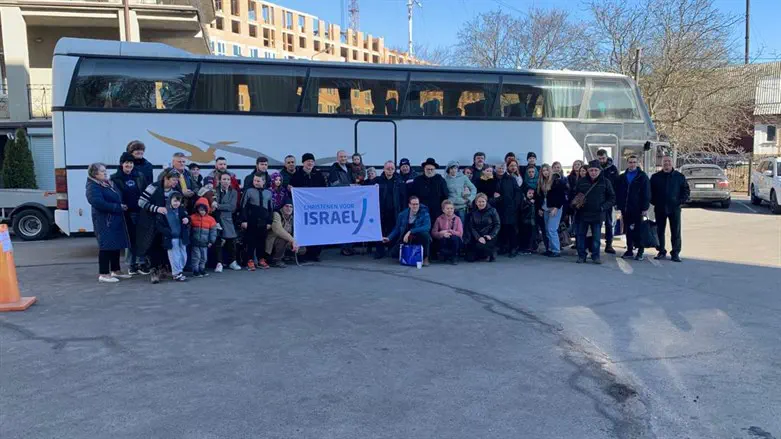
Ever heard of the former island of Urk? Well, neither did most others. But the altruistic residents of this little-known fishing village in the Flevoland province in central Netherlands are now making headlines through a marvelous display of heroism as they brave the fires of war to spirit Jewish Ukrainian refugees across the border to safety.
Urk is first mentioned in a historical record dated 966, back when it was still an island in the Zuiderzee, an inland sea that would 400 years later become part of Lake IJssel, an inland bay in central Netherlands bordering the provinces of Flevoland, North Holland and Friesland. The longtime residents of Urk, which is part of Holland’s "Bible Belt," are simple, benevolent, religious folk who earn their livelihood as fishermen, speak their own dialect and pride themselves on their headstrong nature and intrinsic connection to the sea, which has always been both a faithful companion and adversary.
As one courageous native puts it, “Here in our village, we’ve learned to live with a constant battle against the elements of nature, to fight for our existence.” And this, he adds, is one reason that he and his fellow villagers are sympathetic to the plight of Jews who are also constantly beleaguered and forced to fight for their very existence. “History has shown that every disaster or war always turns against the Jewish population, and acting from this point of view, we wanted to put ourselves at the service of Jewish Ukrainians and help them get safely out of the country.”
To this end, over the course of the last few weeks since war broke out in Ukraine, teams of locals have set out twice weekly from the Netherlands to Moldova, a journey of close to 4 days due to delays at border crossings and poorly-tended roads. Once in Moldova, they are facilitated by a Jewish Rabbi and lawyer from Chisinau who help with arrangements.
“We change teams all the time,” explains Willem, one of many fishermen-cum-bus drivers who volunteers for this unique rescue initiative. “Every weekend, two drivers come and two drivers go; and then again on Wednesday, two drivers come and two drivers go. The drivers fly to Iasi in Romania and then cross the border to Moldova, where their bus is ready to pick up and travel to Otaci, which is on the southwestern bank of the Dniester River on the Ukrainian border. Here, we have a house available where they spend the night before continuing with their life-saving mission.”
The volunteers are in contact with a Jewish team that assembles the refugees and delivers specific instructions to the drivers regarding where to collect the people and transport them. Only once the drivers and refugees have safely crossed the border do they get their first short break, along with a chance to eat and rest up. From there, they are taken to Chisinau or Riscani in Moldova, which both boast shelters for Jewish refugees from Ukraine. Many of these people—the majority of whom are women and children—have been on the road and haven’t slept or eaten a decent meal for days on end.
“They are many harrowing situations,” relates Jan, another volunteer, “and it’s very sad to watch. I’ve seen dozens of families torn apart because the men aren’t allowed to leave the country, and they’re forced to bid their wives and children goodbye on the bus without knowing if they’ll ever see each other again. We also see elderly folks clutching two small bags that contain everything of value. It’s really, really tough.”
Despite the challenges and danger that they face with each rescue run, the volunteers unanimously express that along with the heartbreak and constant anxiety, their work is deeply rewarding. “We see so many instances of kindness, of people giving to others what they have and what they don’t have,” says Fred, who performed last week’s rescue mission along with his partner Jan.
“And through it all, we’re doing our part to give people hope and life, and they’re so grateful. We take them to a safe environment, a place where there are no air raid alarms, where no bombs fall, where they can finally sleep in peace knowing that they’re safe.”
Willem relates that the group is still in contact with some of the Jewish refugees whom they’ve helped spirit to safety. Some of these refugees are already in Israel, while others have remained in the Netherlands. “Wherever they are, we want to be present to help them, either with paperwork or housing.”

